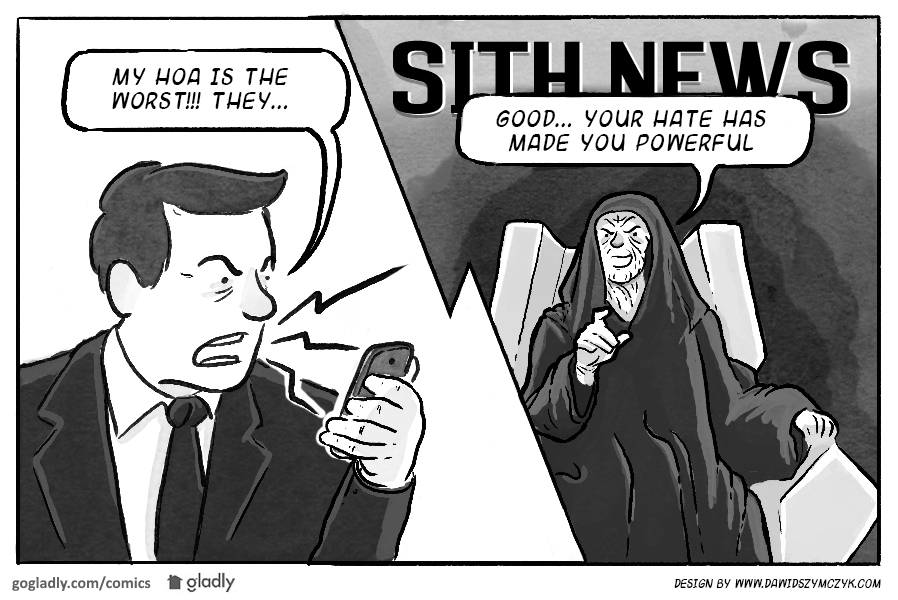Not surprising that in a random sample of newspaper and TV stories focusing on HOAs and condo associations, 13 of 16 stories were about disputes and controversies. Only 3 stories were positive.
Little has changed since that informal survey last July. Just the other day, for example, a story about dog poop DNA testing creating a “stink in one community” was headline news.
The news media love controversies. And why wouldn’t they? Controversies attract readers and viewers like poop attracts flies. So you can bet if there’s some controversy brewing in your association, a newspaper or TV reporter just might come knocking on your door. And it’s not fun when that happens.
Can you do anything to stay out of the headlines?
These three words summarize what might help. Anticipate! Anticipate! Anticipate! When you anticipate what might ignite controversies, you can try to deal with them proactively.
Anticipating controversies, issues and problems can be uncomfortable because you have to think about them as honestly and objectively as possible.
Even if you have to grit your teeth and cringe, getting a handle on things that might go wrong can be extremely helpful. When you identify potential problems, maybe you can do something about them before they become headline news. And even if they can’t be fully resolved, at least maybe something can be done.
So… take a deep breath and grit your teeth. Because a little anticipation can go a long way.
- Avoiding the Headlines - March 16, 2016
- Trendy for Politicians, Terrible for HOAs - January 19, 2016



 Help
Help
One of the challenges we’ve faced is the right of individual privacy versus the right of the individual to give their version of events to everyone who will listen. A compliance issue occurs and the public narrative is shaped by the homeowner that – was towed from a disabled parking space, didn’t remove a dead tree, allowed their kids to graffiti the side of the clubhouse, etc. As a board and management company we can only respond with generalities about how issues are resolved and options every homeowner, including those on the board, may use to ensure their disputes are quickly resolved. Getting ahead of an issue, a coffee cup conversation, can go a long way.
You’re absolutely right, Catharine. Privacy is extremely important. Homeowner associations, like other organizations and businesses, need to be mindful of privacy issues. Because of privacy and for other reasons, as well, spokespersons for organizations and businesses often can’t respond in kind to what someone is saying in news media or during an HOA meeting. I often talk about careful communication, describing it as pressing the ‘pause’ button in one’s mind before responding to something that’s being said or alleged. As you point out, often HOA spokespersons can only respond with generalities. And that’s frustrating, but necessary. It’s particularly frustrating when people residing in community associations make unsubstantiated allegations that association leaders can’t respond to in kind because of privacy and legal considerations. But there are some things that can be done by heading issues and problems off at the pass, by anticipating and possibly addressing them before they make headline news. And something else that can be done…after anticipating potential issues and problems, developing questions and answers — a Q&A — to have available when questions are raised. There are some books about HOA communication and PR, including one I’ve written with examples of questions and answers.
Hi Catharine, thanks for the great comment, The coffee cup conversation helps to humanize the situation and foster understanding on both sides.
Homeowner Association Abuse: The Gates of Hell
What happens at the neighborhood potluck isn’t what happens at a board meeting.
Governance of homeowners associations doesn’t always occur using an open door policy. More than often, key judgments are self-serving and determined utilizing a clandestine, exclusionary, closed-door policy, or “executive session”.
Homeowners must protect their investment and avoid potential exposure.
Following is a true story.
In an established, gated suburban Sacramento, California neighborhood, million dollar homes coexist with lesser-valued properties. Owners enter their garages, shut their doors and don’t ask questions.
They should.
Ostensibly, a homeowner’s association board of directors and contracted management govern this community, a California non-profit mutual benefit corporation. In reality, a biased, unilateral board of directors and contracted management governs.
The genesis: A long-term resident submitted a legitimate plea for assistance controlling a habitually off leash dog. What resulted was the catalyst for discovery of fraudulent practices, neglect of fiduciary responsibility, liability, and censorship of evidence on the neighborhood social media network.
The violations, and others, discovered during a year of examination:
§ Engagement of vendors without contracts or insurance.
§ Payments tendered to vendors with connections to leadership.
§ Oral and written findings of defamation and disingenuous responses to civil code policy questions.
§ Unlawful demands to the association insurance company not to communicate with a named insured homeowner to validate association policy relative to hiring criteria.
The attempt at resolution: Filing of a Director and Officer’s claim forced admission of these practices. Retribution to all homeowners in the form of a credit of one month of paid dues, and homeowners demand these practices
would cease, was submitted to the insurance company negotiating the claim for documented malfeasance. Both requests were denied.
Instead, a personal monetary settlement by the insurance company in exchange for confidentiality was offered.
Translation: Hush money. Gag order. And refused by the claimants.
It is evident these entities consider legislative and civil codes governing non-profit mutual benefit corporations (in California, the Davis-Stirling Act) as frivolous statutes. And, the illegitimate contractual and evasive interpersonal practices persist.
Per the insurance company, the next step for resolution is a lawsuit.
Sue your neighbors?
Given the omnipotence and resistance to respectful attempts for adherence to legally mandated processes, a seemingly necessary constitutional conduit for reform. Unfortunate.